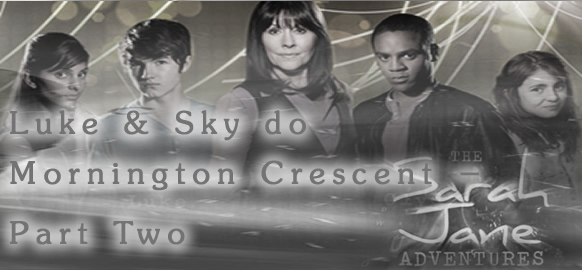

Luke emerged into the glade where Fabro’s Bathers never quite appeared to stand as still as marble should and saw a woman reaching out for a man who was in difficulties in the water. He guessed that the pond couldn’t be very deep. Rather, something was dragging the man down.
Despite the obvious danger he leapt, fully clothed, into the water. He saw at once what was hindering the man. The figure beneath the churned up surface of the pond was vaguely human shaped, but wrapped entirely in greyish black. He couldn’t see a face, but he guessed it was probably alien in some way.
Fortunately, it was not strong enough to fight two people at once. Its grip on the man slackened as Luke tackled it and the fight was soon over when it let go altogether. Luke was only slightly surprised to see the dark figure dissolve away into the now turgid water, but his priority was getting himself and the man out of the water to where Sky and the young woman were waiting anxiously.
“Don’t hug me, you’ll get all wet,” he said to his sister, to no avail. Beside him the man declared that he didn’t do hugs, wet or dry.
“Are you all right, sir?” he asked, trying to remember where he had seen both the man and woman before.
Quite all right, Luke,” the man answered. Luke was puzzled, then he smiled widely and introduced his sister to their mother’s oldest friend, The Doctor. He, in turn introduced his current companion, Marie from Dublin.
“You’re doing the Quest, too. You were at the station,” Sky recalled. “We were looking for The Bathers, for our clue.”
“Then this must be yours,” The Doctor said, handing Luke what looked like a ‘fridge magnet’ with strange script on it. “It’s in Ogham. I think you might be going to Ireland, next.”
A change of clothes at the TARDIS, then a light lunch at the park café, first,” Marie suggested. “And I might be able to help. I did the Ogham alphabet with my class last year.”
Lunch at the open air café in dry clothes was pleasant. Luke and Sky enjoyed Marie’s company as well as the thrill of meeting the elusive Doctor. They talked about their progress so far in the Quest while Marie translated the Ogham text and talked about the students she taught at home in Ireland. The Doctor told the youngsters about one of his adventures with Sarah-Jane Smith when she was a young woman who travelled with him.
They avoided the subject of the grey-black alien who had attempted to drown The Doctor. Luke had a feeling that there was a lot to tell, but Marie, with a teacher’s instinct for appropriate content, didn’t want to worry Sky.
“Your next destination is a place called Montpellier House near Dublin,” Marie told them over ice cream desserts. I know all about it. It’s a ruined building on top of a hill. The Irish version of Lord Byron’s Hellfire Club would meet up there. But it’s a real hard slog to the top. The Doctor and I think we ought to give you a lift in the TARDIS.”
Luke looked at the two adults and wondered if there was something else other than hard walking bothering them. Then he saw Sky’s expression.
They had her at TARDIS.
Luke accepted the offer.
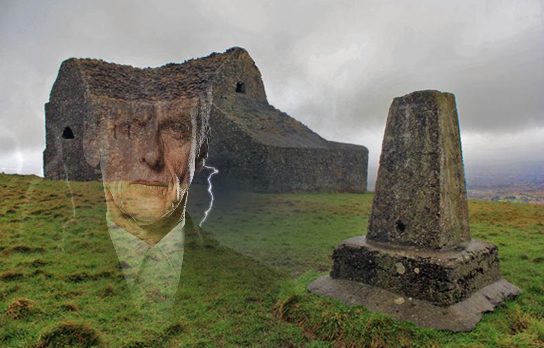
The TARDIS brought them all to the summit of Montpellier Hill on a warm afternoon in Nineteen-Forty. With the rest of Europe immersed in the chaos of war, neutral Ireland was relatively quiet. Marie and Sky sat on a picnic blanket drinking fizzy orange from the sort of plastic bottles that wouldn’t be invented until the Nineteen-Seventies. They watched a herd of deer gambolling by and steadfastly avoided looking at the creepy, burnt out ruin of an old house where the clue led them.
“What is a Hellfire Club, anyway?” Sky asked.
“In the Eighteenth century rich men with nothing better to do came up here to drink and probably do drugs and anything else that they’d be arrested for in town. There were rumours about devil worship, but The Doctor says that was just exaggeration. Mostly it was drinking and noise, I think.”
“How would The Doctor know if it was exaggerated or not?”
“I have no idea, and no intention of asking. I think he WANTS me to ask so he can tell some tall tale about hanging out with that crowd, but I’m not going to.”
Sky laughed with her, then both of them became very serious as The Doctor and Luke returned from the old house with a dishevelled and half-starved man they had found there.
They gave the stranger food and drink, and from his accent and his nervous use of his own language from time to time, Luke made a guess at what he was.
You’re a German spy? Sent to infiltrate Britain through neutral Ireland.”
“Did they do that?” Sky asked.
“Yes,” Marie answered. “Not very successfully, but they tried.”
“I am Herz Brenner,” the man said. “I am from Cologne. I came to this country by boat and was brought to this hiding place by my contacts in your IRA. I was meant to stay one night before they would come back with identity papers and a car that would take me elsewhere. But they did not come back. It has been a week. I have no food, no money. I do not know the city below me. I cannot seek help....”
“There’s a local story about three men from the ‘Brigade’ who died in a car crash one night in Nineteen-Forty,” Marie confirmed. “Ireland isn’t at war, but there is a blackout, and roads are dark.” She, too, felt that her tenses were very mixed between her local history and their current temporal location, but her friends understood her meaning.
“Explains why nobody came back to him,” Luke commented.
“Yes, but that’s only half the story, isn’t it,” Marie added. She glanced at the plate Luke had brought. Though the man was desperately hungry he had left a large slice of fresh, juicy ham and egg pie. “You’re not a German spy at all. You’re….”
“Ah!” The Doctor remarked dryly.
“I am Salomon Kramer,” the hungry German revised. “Brenner is a friend of mine. He has risked much to put me on the boat in his place. I hope he is still alive back home in Germany. His actions will not be understood.” He glanced at the surprised listeners. “Yes, I am a Jew. I was afraid to tell you….”
“What?” Sky was appalled. “You mean you thought we’d be kinder to a spy than a Jew?” She looked at the adults around her who shook their heads in understanding. “But I thought the war was about saving Jewish people from those horrible camps.”
“The war is about property and territory like every other war,” The Doctor told her. “Few people in the allied countries knew about the camps and many thought Hitler had the right idea in getting rid of Jews.”
“That’s horrible.”
“Yes, it is,” Marie agreed. “Sky, why don’t you take the pork pie back to the fridge and put as much bread and cheese and other things Mr Kramer CAN eat into a bag. Something to drink, too, but not Club Orange in PET bottles.” She reached into her pocket for a pen and paper and wrote down an address and a neat little map of intersecting roads. “Salomon, this is the location of the Hebrew Congregation in Terenure. It’s a bit of a tiring walk for you, but not so far as you’ve come already.”
Of course, the TARDIS could drop him off in moments, but that would introduce him to technology he was not meant to know about.
Salomon Kramer cried at the kindness shown to him. He took the food and drink and directions to a place of safety gratefully. The Doctor walked part of the way down the hill with him. By the time he returned Luke and Sky had worked out the clue that was in the fireplace at the Hellfire Club.
“It’s a place in the Netherlands that has a street festival with dahlia flowers,” Sky explained. “It sounds nicer than this. I mean… sorry, Marie. I’m sure Ireland is nice most of the time, but I think that house is creepy, and that poor man would have died if we hadn’t found him. I’ll be glad to go somewhere else.”
“I understand,” Marie told her. “Maybe you can have a better trip to Ireland another time. There are many other places than this to see.”
The two siblings left The Doctor and Marie on the hilltop and programmed the Vortex Manipulator to take them to their next destination.
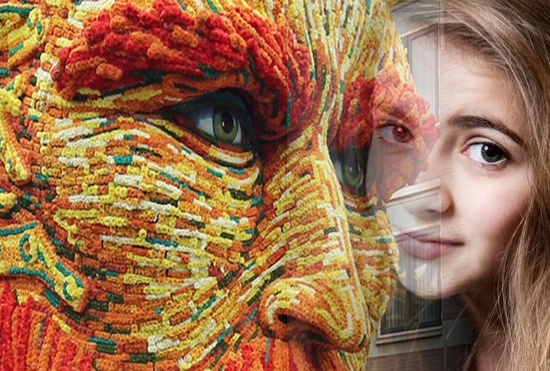
“This looks nice,” Sky said as they walked around the centre of Zundert, the small Dutch town that could boast two great claims to fame – as the birthplace of Vincent Van Gogh and the annual flower parade called Bloemencorso Zundert.
This year, according to the posters all around town, the two great features were coming together. Bloemencorsco’s theme was the paintings of Van Gogh.
“Ohhh, I like his paintings,” Sky enthused. “Clyde has a big book with almost all of them in it.”
“Most of them are in the Musée D’Orsay in Paris,” Luke told her. “He didn’t do much painting in his birthplace. I think the museum here is mostly about his life. Anyway, we really need to find a place to watch the parade. It’s getting busy, now.”
They managed to find a spot not far from the Zundert Van Gogh Museum and stood on the kerb. The crowd thickened around and behind them and the buzz of excitement grew. Neither Sky nor Luke had been to very many parades. Being born as teenagers meant they had missed out on a lot of things. Sky looked enviously at some of the children being carried on their parent’s shoulders. That was something neither of them had known.
There was a sudden rise in the noise level as the first of the floats reached them. Until then Sky had been a little puzzled about how a whole festival could be based on dahlias. Now she saw a huge three-dimensional representation of Van Gogh’s Sunflowers mounted on a low loader. The whole thing was made of different coloured fresh, real, dahlias mounted on a wire frame. It was amazing. The colours dazzled and the scent of fresh flowers filled the air.
Sunflowers was followed by Still life with Basket and Six Oranges. The oranges were taller than Sky and the texture of the ‘skin’ was beautifully realised in hundreds of individual flower heads. Behind that was a self-portrait that Sky found just a bit disturbing. She always thought Van Gogh had a nice face, but enlarged to the size of a lorry’s front cab and made up of multi-coloured flowers it was a bit daunting. That float was followed by an easier one, Le Moulin de la Galette, featuring a windmill with sails actually turning. But then the next float was another head – two heads, in fact - Old Woman in White Cap with Head of a Man with Pipe back to back. She found them both a bit creepy realised in giant flower sculptures.
“Do you know that the Dahlia comes in every possible colour except blue?” Luke said to his sister.
“What if they want blue for a float?” Sky asked.
“I suppose they must use purple.” A case in point passed them by. It was a huge reclining figure in a purple suit with a paintbrush in hand – the artist asleep in the middle of his work. The purple was striking, but it was a little unnatural. Luke was sure that the suit was meant to be blue.
As he was wondering, Sky felt something pressed into her hand. People with baskets were walking along handing out flowers.
Sky was surprised to find herself holding what she had just discovered to be impossible – a blue dahlia.
There was a little label attached to the stem. She looked at it.
“You know how you were saying about Van Gogh’s best work being in the Musée d’Orsay,” she said showing her brother the stamp sized image of the famous Parisian art museum.
“Look at this, too,” Luke added, pointing to something half-hidden within the impossible dahlia. Sky thought at first it was a real insect, then realised it was a half life-size model of a honey bee made of silk threads.
“Bees and art museums?” Sky was puzzled.
“We’ll work it out. Let’s enjoy the rest of the parade, first, though. I want to see how they manage Starry Night without blues.”
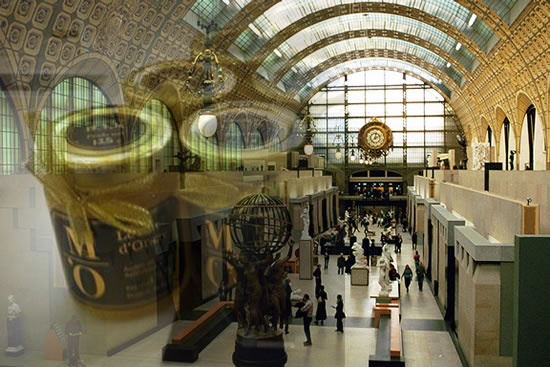
The Musée d’Orsay looked old, but that was because it was built as a railway station in the late Nineteenth century. It had only been an art museum since Nineteen-Eighty-Six.
It didn’t matter to Sky. She was just delighted to be there. She found all of Van Gogh’s best known works as well as so many others she hadn’t seen reproduced in coffee table books.
What she didn’t find was anything to do with bees. The clue was still a puzzle.
“It’s all right, I think I get it,” Luke said as they came back to the foyer after seeing everything there was to see. “Souvenir shop, come on.”
Sky was puzzled, but she followed her brother to the shop selling books and posters and other tasteful keepsakes. She was surprised to see Luke make a literal beeline for….
“Pots of honey? Why do they sell honey in the Musée d’Orsay?”
“I remember reading about it ages ago. There are beehives on the roofs of several of Paris’s grand buildings. The most famous is the Palais Garner, the Opera House known for the Phantom. But the Musée d’Orsay has bees, too. This is their honey, and, look, this is our final message.”
“Final message?” Sky looked at the honeypot Luke gave her and saw the tiny words around the edge of the label.
“Congratulations, you have completed the Mornington Crescent quest. Return to the station by six a.m. on the last morning to be in with a chance for the grand prize.”
“Oh, so it is all over? What a pity. I was enjoying it so much.”
“There will be next year,” Luke promised. “Let’s pay for the honey and however many posters you want, and we’ll head back. I want to ask The Doctor about something, anyway.”
Camden High Street first thing in the morning was far less exciting than the places they had explored, but meeting The Doctor and Marie again was a bonus. Luke got ready to ask his question, but it was pre-empted.
“Yes, The Doctor looked into it for us,” Marie told them. “Salomon had to fight to stay in Ireland. There were plenty of anti-Semites there who would happily throw people like him back to the Nazis, but he made it. His friend who got him out of Germany escaped to Switzerland and faced the same problems, there.”
“Despite the impression given by The Sound of Music neutral countries weren’t open to every refugee who climbed every mountain,” The Doctor explained. “But he made it, too. They both had families and lived to ripe old age.”
“Oh, good,” Sky sighed. “I’m so glad.”
“Human wars, so futile,” The Doctor added. “When you pudding heads grow up you’ll find out there are more important things to fight about.”
He meant humans in general had to grow up, not Luke and Sky in particular. They knew that, just as they knew what a small thing it was that two people, with a little of their help, had happy endings in the midst of so much widespread misery. It was enough to make them happy even with The Doctor calling all humans pudding heads.
It was even enough that they didn’t mind not winning the big prize.
“We don’t need a bottomless purse of money, anyway,” Sky admitted. “Our lives are okay without riches of that sort. I think that might be sort of the point of doing things like this, to find that out.”
“No,” Luke answered. “That sort of sentiment only counts in Disney films. But it’s all right. Come on. Let’s go home and give mum some Parisian honey for a surprise.”

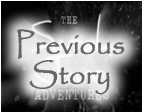 |
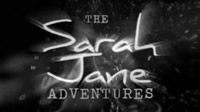 |
 |